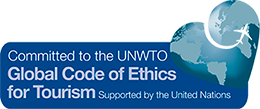Our pledge to the UNWTO World Tourism Ethics Charter
HIS Group signed a pledge to the Charter and is working to raise awareness both internally and externally.
The Charter sets forth voluntary efforts by governments, the tourism industry, local communities, tourists, and other stakeholders involved in the development of the tourism industry, in order to achieve responsible and sustainable tourism. This includes the eradication of exploitation of people (particularly children) in the tourism sector, protection of the natural environment, providing tourists with honest information, guaranteeing basic workers' rights, contributing to the enhancement of cultural heritage values, and implementing activities beneficial to host countries and local communities.
Global Code of Ethics for Tourism (10 Articles)
Global Code of Ethics for Tourism (GCET)
Article 1 Tourism's contribution to mutual understanding and respect between peoples and societies
Article 2 Tourism as a vehicle for individual and collective fulfilment
Article 3 Tourism, a factor of sustainable development
Article 4 Tourism, a user of the cultural heritage of mankind and contributor to its enhancement
Article 5 Tourism, a beneficial activity for host countries and communities
Article 6 Obligations of stakeholders in tourism development
Article 7 Right to tourism
Article 8 Liberty of tourist movements
Article 9 Rights of the workers and entrepreneurs in the tourism industry
Article 10 Implementation of the principles of the Global Code of Ethics for Tourism
Global Ethics Charter and Corporate Social Responsibility
The Private Sector Commitment to the UNWTO Global Code of Ethics for Tourism
A summary of the provisions most clearly related to private sector and corporate social responsibility in the World Tourism Ethics Charter.
Article 2:
Tourism activities should respect the equality of men and women; they should promote human rights and, more particularly, the individual rights of the most vulnerable groups, notably children, the elderly, the handicapped, ethnic minorities and indigenous peoples;
Article 3:
Tourism infrastructure should be designed and tourism activities programmed in such a way as to protect the natural heritage composed of ecosystems and biodiversity and to preserve endangered species of wildlife; the stakeholders in tourism development, and especially professionals, should agree to the imposition of limitations or constraints on their activities when these are exercised in particularly sensitive areas: desert, polar or high mountain regions, coastal areas, tropical forests or wetlands, propitious to the creation of nature reserves or protected areas.
Article 5:
Tourism policies should be applied in such a way as to help to raise the standard of living of the populations of the regions visited and meet their needs; the planning and architectural approach to and operation of tourism resorts and accommodation should aim to integrate them, to the extent possible, in the local economic and social fabric; where skills are equal, priority should be given to local manpower
Article 6:
Tourism professionals have an obligation to provide tourists with objective and honest information on their places of destination and on the conditions of travel, hospitality and stays; they should ensure that the contractual clauses proposed to their customers are readily understandable as to the nature, price and quality of the services they commit themselves to providing and the financial compensation payable by them in the event of a unilateral breach of contract on their part. Tourism professionals, so far as this depends on them, should contribute to the cultural and spiritual fulfilment of tourists and allow them, during their travels, to practise their religions
Article 9:
As an irreplaceable factor of solidarity in the development and dynamic growth of international exchanges, multinational enterprises of the tourism industry should not exploit the dominant positions they sometimes occupy; they should avoid becoming the vehicles of cultural and social models artificially imposed on the host communities; in exchange for their freedom to invest and trade which should be fully recognized, they should involve themselves in local development, avoiding, by the excessive repatriation of their profits or their induced imports, a reduction of their contribution to the economies in which they are established

